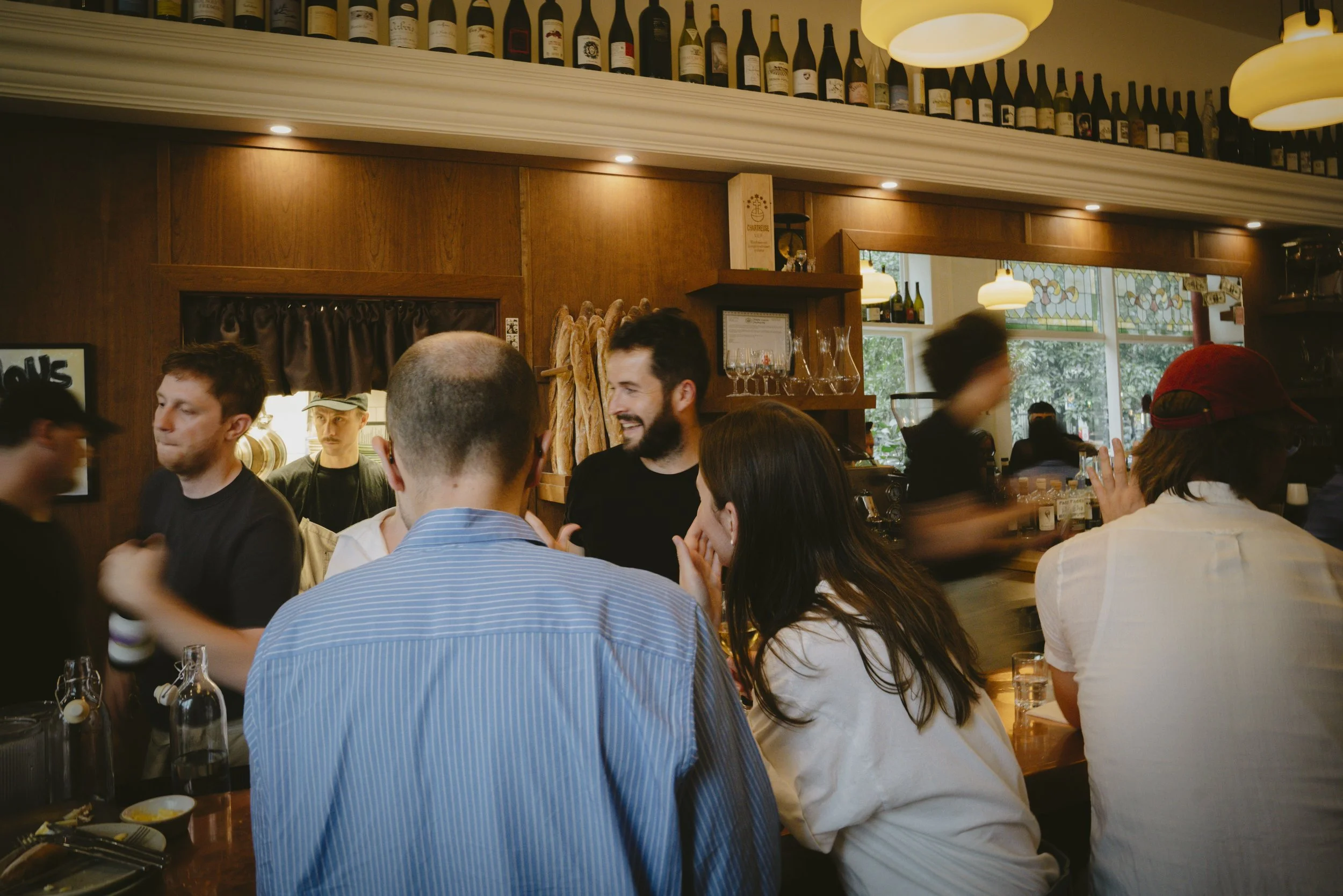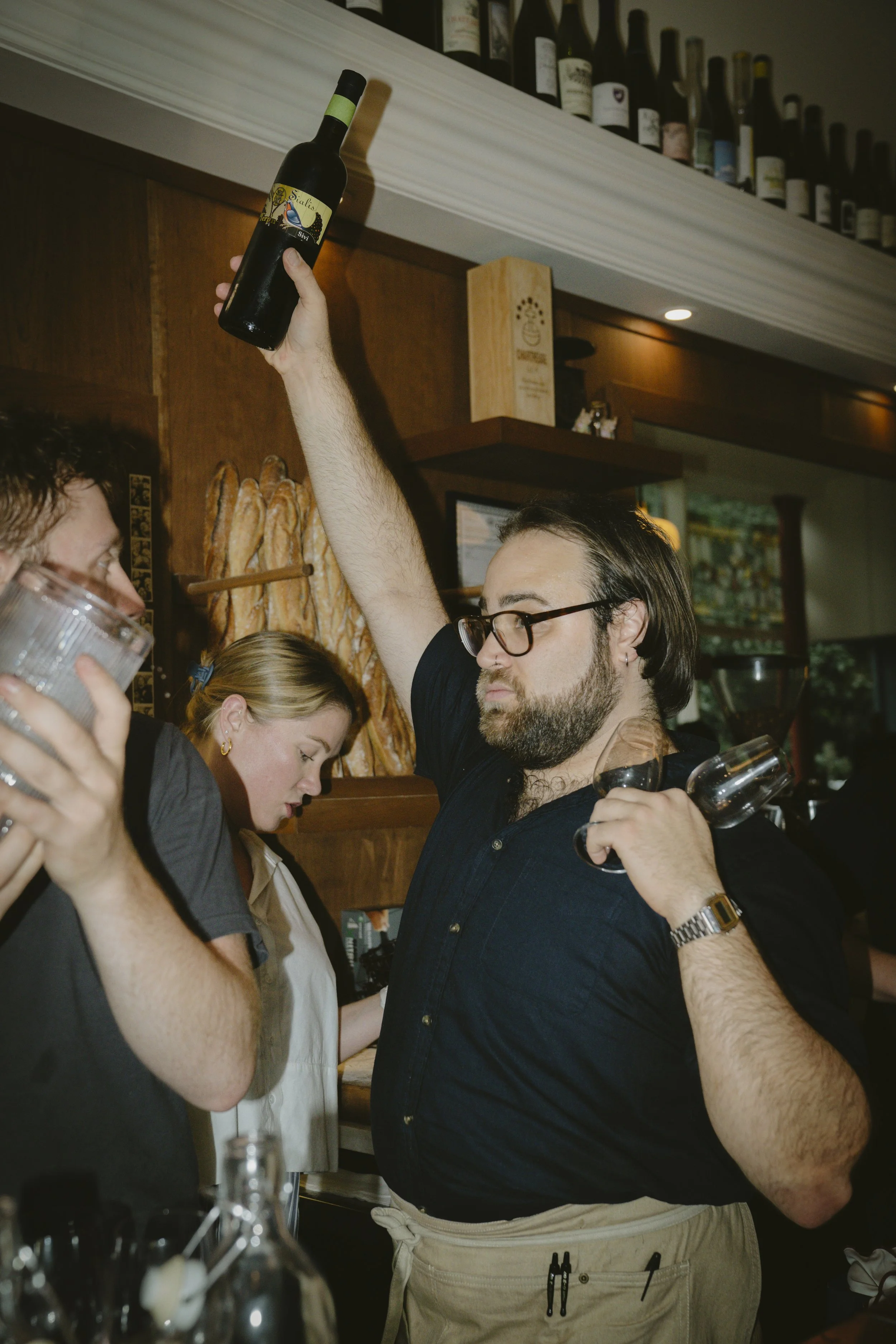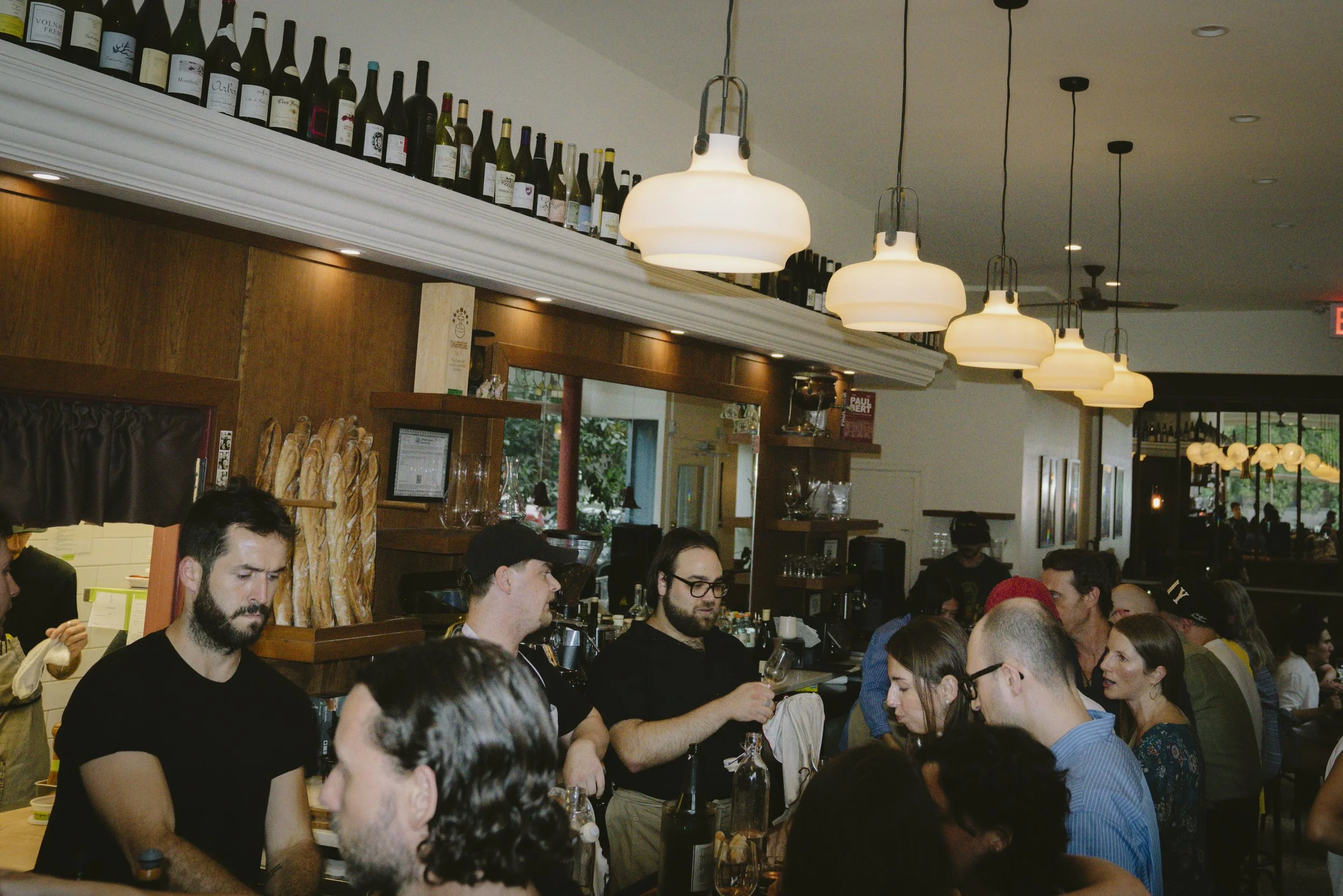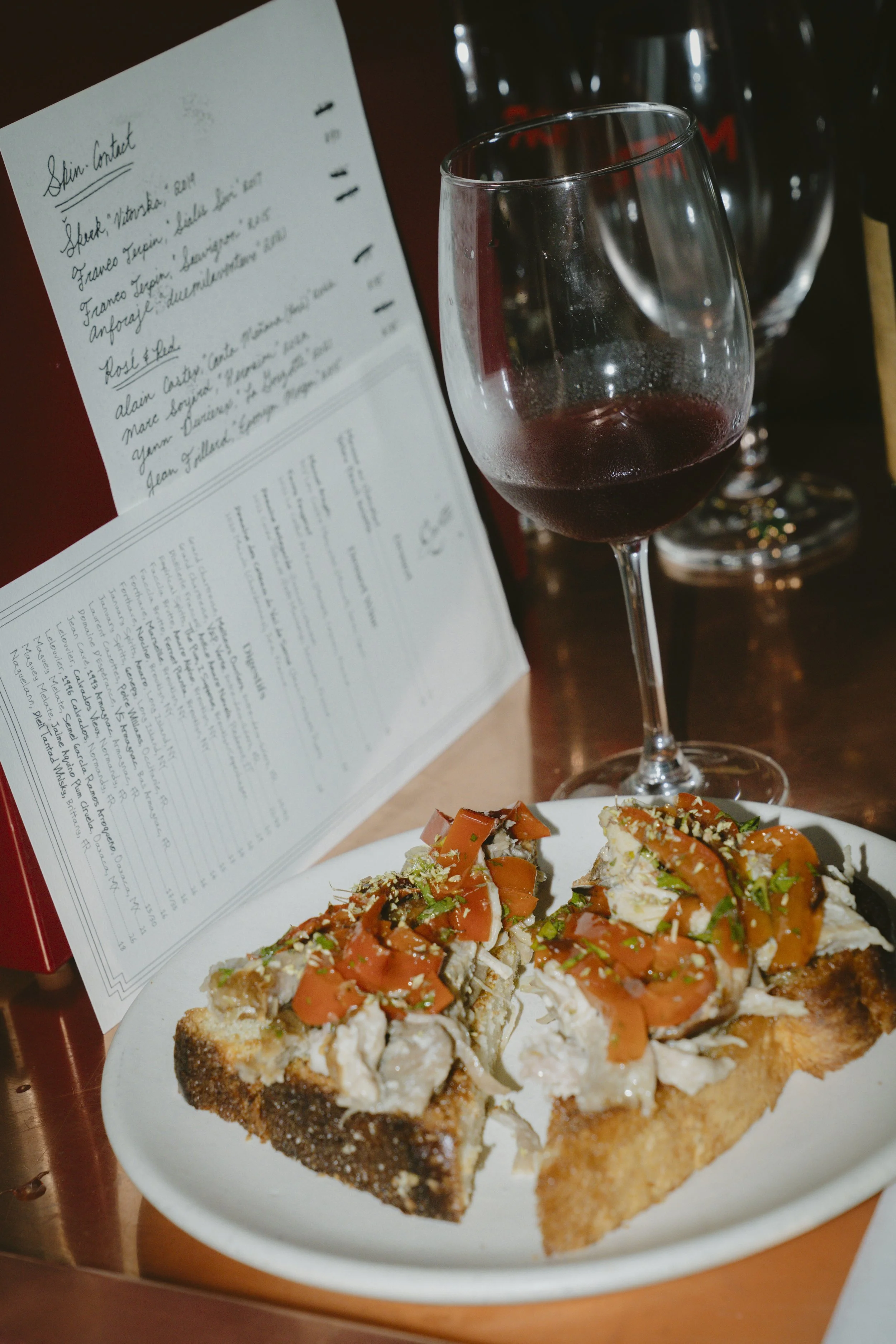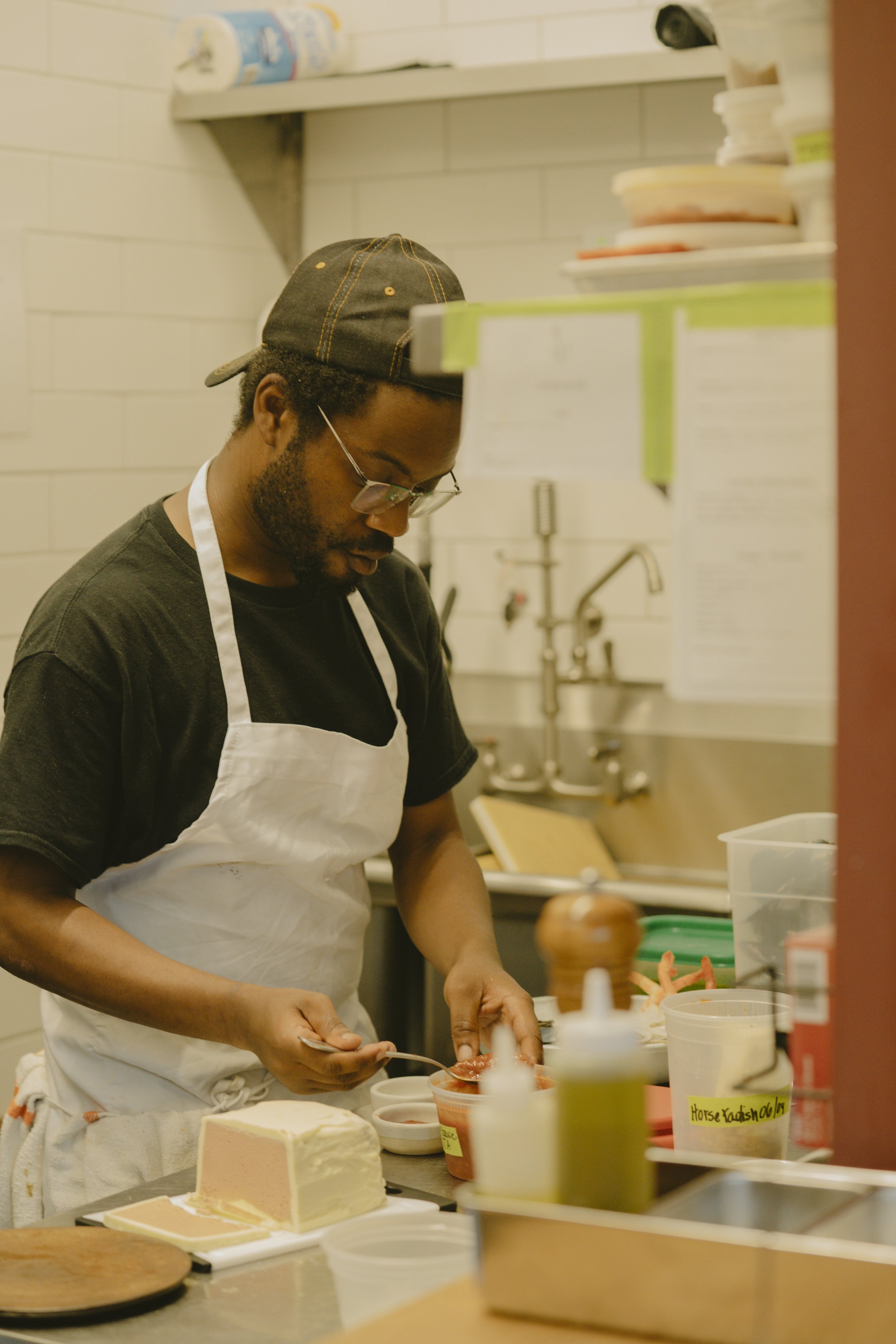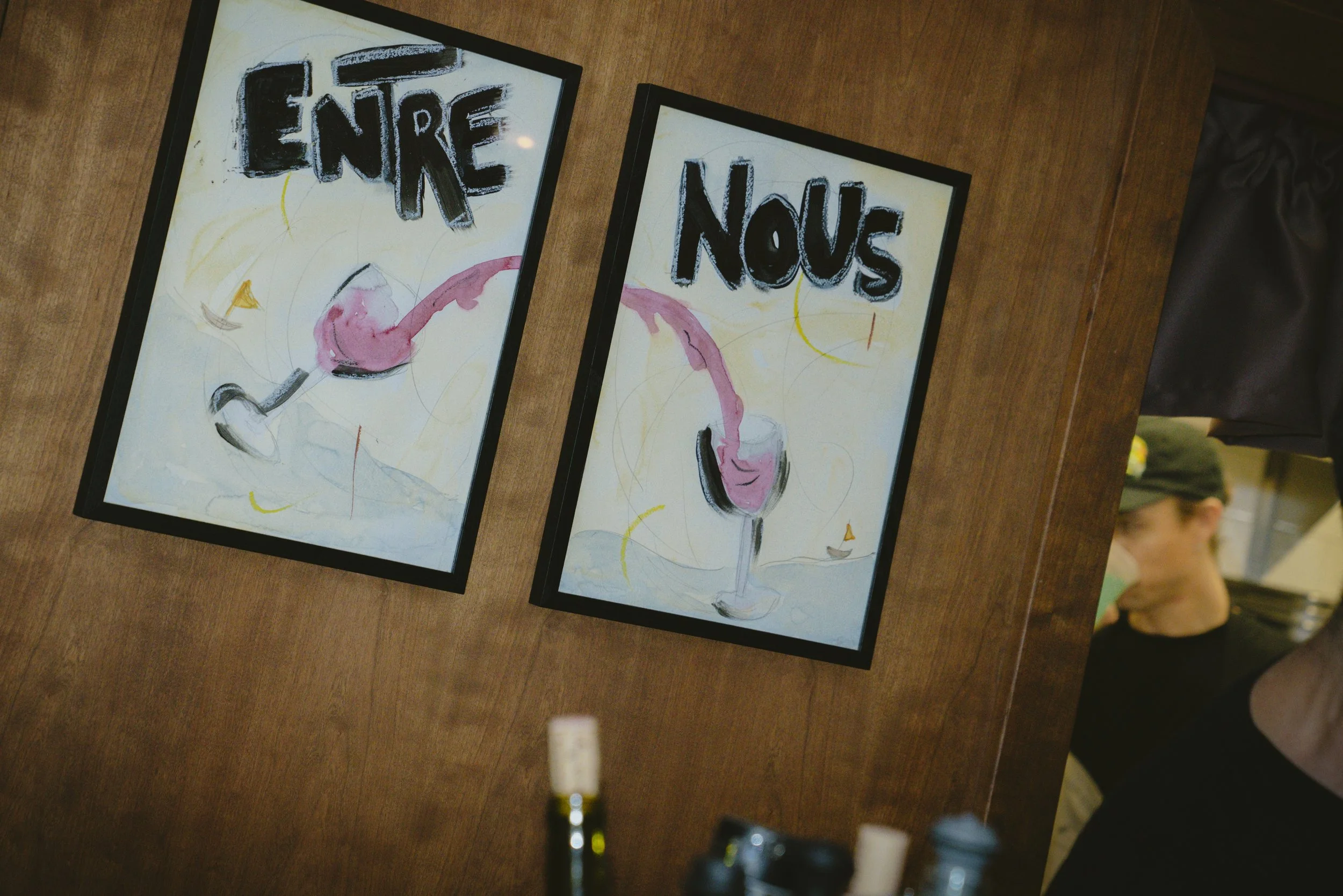Inside The Neighborhood Wine Bar New York Deserves
A look at the people, philosophy and beautiful chaos behind Clinton Hill’s favorite corner.
Written by Spencer Fox
Photography by Rosalind O’Connor
An integral part of the idealized New York City experience is having a “neighborhood spot,” a restaurant, bar or coffee shop that feels like an escape and second home in equal measure. Whether your folks are in town or you just need a quick drink after a rough day, their doors will be open and a seat will be waiting. But in this bleak age of reservation scalping bots, influencers shilling out glowing food reviews to the highest bidders and ever-rising costs, such a place feels like a relic of a different time. However, on a quiet Clinton Hill corner, Clément Besset and Allie Prater have given the people of this city a place they can truly call their own. Entre Nous or, “between us” in French, offers a glimmer of hope amongst the sterile, overbooked and aloof institutions that sully New York’s dining culture.
In order to truly appreciate and understand the breadth of Entre Nous, we need to go back to a night in 2019 when Clément poured a bottle of Sylvie Augereau’s Réjouissances for two diners seated at his Fort Greene restaurant, Fradei. They discussed a mutual love for Pineau D’aunis and, ultimately, the three shared the sort of idyllic New York City evening that rarely materializes outside of film and television.
Unfortunately, one of those two diners, Allie Prater, had to return to her then-home of Los Angeles soon thereafter. Fast forward a year later, in the throes of the pandemic, Allie and Clem kept in touch and established a standing apéro hour by way of Zoom every week. The transition from customer to friend to life and business partner came quick, and so too did Allie’s inevitable move from Los Angeles to New York City as soon as pandemic travel restrictions were lifted.
This sort of decisionmaking at breakneck speed would come to define the working relationship that Allie and Clem have fostered over the years and it’s hard to imagine either of them doing things any other way. Whether it’s hospitality, interior design or wine, the two share stances that are as informed as they are unwavering. This equips them with a sort of superpower: the ability to shoot from the hip with reckless abandon and uncanny precision.
Entre Nous stands as a chapel to their steadfast ideals. For all of its finesse and manicured detail, the Clinton Hill wine bar thrives on controlled chaos: fifth chairs pulled up to a four top, diners drinking bottles of carbonic Gamay while comfortably crowded around the back corner of the bar, a staff that giddily patrols the floor with permasmiles and a staggering knowledge of food and drink. It’s by no means fine dining and it’s certainly leagues above whatever wine bar du jour just opened up around the corner from your apartment. To put it plainly, Entre Nous is Allie and Clem—their passion, their ethos, the wine and food they love and their indefatigable need to share all of the above with anyone who cares to pull up a chair.
We sat down with Allie and Clem to talk about their early days in the service industry, the chaos and charm of running a neighborhood spot and the wines that keep them inspired.
How did each of you end up in hospitality?
Clem: I started in hospitality right after ending my soccer career. My first job was at Aux Deux Amis in Paris and pretty quickly I knew I really wanted to open my own place one day, but it’s gotta be in the U.S. I came to New York and basically never left.
What pushed you away from France?
Clem: I wanted to bring something somewhere else. My first job in New York was at this little restaurant in Williamsburg, not my ideal place, but it allowed me to stay in New York. From there, I grinded a lot, drank a lot of wine, learned, and eventually opened Fradei.
And what about you, Allie?
Allie: A lot of people start in hospitality right after school then leave and get a corporate job but I did the reverse. I spent 10 years in the corporate marketing world but always loved wine. In 2017, I decided I wanted to better articulate my wine preferences, so I started doing some formal education. Through that, I met people in the industry and realized I wanted to change careers. One day I saw a liquor license notice in a space under construction, looked it up and discovered it was what became Place des Fêtes. As soon as they started hiring, I applied, told them I knew wine but had no hospitality experience, and they hired me. I started as an assistant server, then a server, and within a year was Assistant GM.
Were you still working at your corporate job at that time?
Allie: Yeah, I’d log off at four, and go straight to the restaurant, checking Slack and my emails in the bathroom during service. It was crazy, but I quickly realized I loved it and eventually left the corporate world for good.
It seems like you both got here through big leaps of faith. Do you see that in each other?
Allie: It's really funny in retrospect because I'm not a leap-of-faith person. I'm a very calculated planner. I'm really surprised I did what I did, but now that I'm in it I can't imagine it any other way.
Did it always feel inevitable that you’d open your own spot together?
Allie: Definitely. We started talking about it as soon as we started dating. It had always been a dream of mine, and when I was managing at Place des Fêtes we began putting together a concept deck and talking to potential investors. From there, things started happening quickly.
Was there anything from your previous experience in the industry that informed the way you approach running Entre Nous?
Allie: We’re a wine bar, so we’re inherently casual, but you can be casual without sacrificing great hospitality. Being able to be an establishment that's casual, but where you're always going to get thoughtful service was important. On the flip side, I didn’t want to be the kind of place that says no if someone wants to add a chair or stand at the bar. Being a place where it's truly like, Hey, we're out of normal chairs, but we've got a folding chair in the basement. If you're cool sitting on that or if you're cool sitting on the window, as long as you're happy with it, we're happy with it. As long as we can still operate, we’ll say yes.
Clem: If you want to stand and eat, go for it. At Aux Deux Amis, people would grab a plate, stand where they could fit, have a glass of wine, a little bite of tuna crudo and be happy with it. That's it.
Allie: There was a night at Aux Deux Amis while we were in the process of opening Entre Nous and we were there for three hours. The whole time we were standing in a tiny corner of the bar and ended up having a full meal and two bottles of wine. We were so happy.
It's not about perfection or poise, it's just about being welcomed in.
Allie: Exactly.
Clem: At the end of the day, we’re talking about food and wine. We're not saving lives, we aren’t doctors. But it doesn't mean that you shouldn’t care about good service or pay attention to details, it's about a certain level of chill. Everything's gonna be okay. Keep it light. Take it seriously, but keep it light.
Allie: I do just wanna caveat, I'm not trying to disparage places that don't want you to stand at the bar or have a joiner at your table. I understand that in some environments that could be disruptive to other guests. But we are a wine bar and we can ditch those parameters at Entre Nous.
What sort of principles or ideas were you two using as a guiding light when building out Entre Nous’ wine list?
Allie: We started with producers we know personally. Clem's French and has been doing this for years, so he knows many of them. Since we’ve been together, I've been able to meet a lot of them and it was important for us to have that reflected on our list. We've traveled a lot and always prioritized visiting winemakers from all over the world, like South Africa, Chile and Argentina. So that was priority number one.
Priority number two was producers we've just loved over the years, but haven’t met. Some of those are benchmark producers, the stuff that all of us who love natural wine love. But we veer a little more classic in our palates. We want to make sure it's as low intervention as possible, but for us, it needs to be clean. There are a lot of super important producers who have been doing this for a long time who get left off of some of the more natural wine lists because they don't come across as natty as others and they are so important to honor. Ultimately, a great wine list needs to be a combination of the greats: the old guard as well as the people who are changing the way things are being done. A balance between the two.
When you know a winemaker personally, how does that change the way you share their wines with guests?
Clem: It's one of the most important things—to be able to share the winemaker’s essence, who they are and what they do, with as much enthusiasm and clarity as possible to the customer.
Allie: We're a curator and conduit. You can memorize a tech sheet, but it's more fun to talk about the experience of having tasted the wine out of the barrel in the winemaker's cellar. Winemaking is so philosophical, they put a lot of thought into how they do things and why, and when you learn that from them on their property, you never forget it. You really see the evolution of that wine and connect with it in a way that you can't get just by tasting it.
Are there any regions or producers that you guys are particularly excited about right now?
Clem: We went to South Africa and that's a country that I'm super excited about because it's brand new and so few people drink it here.
Allie: Brand new to us.
Clem: Yeah, it’s not a discovery but we had our honeymoon there to visit some winemakers in South Africa and being able to see what they do, how they do it and how they're spreading low intervention winemaking for years now, it was really cool.
Allie: I've loved visiting winemakers in France, and many of them have become close friends. But two of my most transformational visits were in South Africa at Mother Rock, where the winemaker who goes by ‘Stompy’ was in the process of planting vines and beginning to develop his estate. The vines are these tiny wild bushes growing in the midst of this insane brush to the point where you almost had a hard time identifying what was vine and what was brush. The only way you could tell which was which is because he had straw matted down around the base of the vines.
Then in Chile, we went to the Marga Marga and visited a producer who I was exposed to through Place des Fêtes, Herrera Alvarado. Carolina and Arturo Herrera are a husband and wife team and they are so incredible. Carolina is the president of Slow Food Chile and together they live around being low intervention. We were messaging with them to plan our visit and realized that they didn't speak any English and we really don't speak much Spanish so we were like well, should we try to find a translator? They basically said, no, you don't need a translator, we will communicate. Sure enough, we communicated beautifully and it was so cool. Their cellar is a mud hut and everything they do, they took back to pre-colonial winemaking—open fermentations in cow hides, they use a zeranda, which is like a row of bamboo sticks that they use to destem grapes—it was honestly one of the most fascinating visits I think we will ever have. We’re just now putting on two of their cuvées on our list here and I can't wait to talk to guests about them.
I'm kind of thrilled that none of the winemakers you just mentioned were French.
Allie: I mean, visiting winemakers in France is great.
Clem: And it's pretty easy to go to France. I'm French, obviously, but going to South Africa, somewhere so far away where some importers don’t even bring wine in from, it's nice being able to visit them.
It’s also this notion that western wine culture is so baked into our cultural consciousness. Everyone has a vague idea of what a French vineyard might look like but it sounds like you guys went to outer space.
Allie: It kind of felt like it.
Clem: In Chile, those País vines are huge. It's like a forest.
Allie: You're in the jungle, but it's a vineyard. It's crazy.
What other wines have you been drinking lately?
Clem: There's a lot of good wine and a lot of wine that I love but Maison des Saules, their Madeleine Cuvée, 100% Chardonnay. They’re a bit more south where there’s not that much wine coming out of. But yeah, the whole thing, it’s very, very layered and a well balanced wine. Great texture, super great acidity in the back with a tiny bit of reduction. Kind of like everything that I want in wine in one bottle. It just blew me away.
Allie?
Victoria Torres Pecis is a winemaker on La Palma, which is not one of the most common winemaking islands in the Canaries. Her family's been making wine for five generations and she’s now the sole caretaker of the vines.
The specific bottle of hers that I really love is Las Migas, which means the crumbs. It's Listan Blanco. The other winemakers on the Palma for the most part are working pretty conventionally but her family has always farmed organically. This wine in particular is just the perfect balance of texture and complexity and that saline minerality you get from super volcanic soils with just the tiniest bit of reduction that you’re always gonna get with the Canary Islands but in a balanced way.
What would each of you pair on the Entre Nous menu with those wines?
Allie: With Las Migas, I would start with the mussels because they're lightly pickled in champagne vinegar and that’ll match the acidity. I would probably also do croquettes because they're rich and fatty and the acidity and reduction offers such a nice counterpoint to those two.
Clem: Hmm. That's a good question. I didn't think about this.
Allie: I know what I would pair with your wine. The hake.
Clem: I don’t know. To be honest it can be had by itself. I don't think there's a perfect pairing with it. I think at the end of the day that wine can be had with anything.
Allie: Drink it with anything or nothing.
Clem: Anything or nothing.

